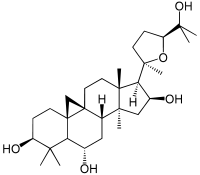Cycloastragenol
 | |
| Names | |
|---|---|
| Other names
Cyclogalegigenin; Astramembrangenin | |
| Identifiers | |
| 84605-18-5 | |
| ChemSpider | 10252332 |
| |
| Jmol-3D images | Image |
| PubChem | 44144539 |
| |
| Properties | |
| C30H50O5 | |
| Molar mass | 490.72 g/mol |
| Except where noted otherwise, data is given for materials in their standard state (at 25 °C (77 °F), 100 kPa) | |
| | |
| Infobox references | |
Cycloastragenol is a molecule isolated from various species in the genus Astragalus that is purported to have telomerase activation activity. A single in vitro study done in 2009 led to claims that cycloastragenol may activate telomerase, leading to controversial claims for its role in reducing the effects of aging.[1]
History
Cycloastragenol was studied by Geron Corporation and sold to T.A. Sciences in early 2013 who are developing it as a product named TA-65. Bill Andrews of Sierra Sciences has done testing on the anti-aging aspect of TA-65,[2] however quality trials on the benefits of the product, are lacking, and there are no high impact journal articles reviewing the efficacy of the TA65-MD, or indeed cycloastragenol.
In late 2013, RevGenetics released their conclusions on TA-65 that showed it is the single molecule cycloastragenol used in TA-65.[3] More recently, on May 15, 2014 RevGenetics released a press release where they provide new information about a public UK government application where TA Sciences state (among other things) that the active ingredient in TA-65 is cycloastragenol.[4]
Potential pharmacology
Its method of action is to activate the hTERT gene, thereby activating the enzyme telomerase.
Cycloastragenol intake improved health span (not lifespan) in mice,[5] however the researchers did not investigate the extension of lifespan in the studied laboratory mice as this was not the focus of the project (it was associated aging diseases). Although the first TA Sciences study was done in 2005 for supplement based telomerase activators, in the 8 years since the first study, there has been no study done that shows a telomerase activator taken as a supplement has extended lifespan.
As part of a study sponsored by RevGenetics, the cycloastragenol based product TA-65 was tested by UCLA scientist Rita B. Effros and RevGenetics[6] scientist Hector F. Valenzuela. The small study (6 participants) found that TA-65 activated telomerase in all samples of subjects tested, while another telomerase activator did not.[7] The clinical significance of this work is uncertain.
Toxicity testing has shown it to be safe for human consumption. TA-65 was shown to improve biological markers associated with human health span through the lengthening of short telomeres and rescuing of old cells, although the significance of these findings in actual life expectancy is unknown.[8] Publications in high-impact peer-reviewed journals are lacking however, and much of the online documentation supporting its use is sponsored by its manufacturers.
As disordered telomerase function is a feature of almost all cancers,[9] there is an unknown, but theoretical risk of oncogene-mediated cancer promotion through the use of telomerase activators.
References
- ↑ Cycloastragenol extends T cell proliferation by increasing telomerase activity
- ↑ Dr. Bill Andrews anti-aging test of TA-65
- ↑ TA-65 Molecule is Cycloastragenol
- ↑ TA-65 is 98% Cycloastragenol
- ↑ TA-65 Study elongates short telomeres and increases health span of mice
- ↑ TA-65
- ↑ Valenzuela, Hector F; Effros, Rita B; Dimler, Taylor; Sweeney, Greg; Bateman, RileyH; Malgora, Brenda (14 January 2013). "Functional Assessment of Pharmacological Telomerase Activators in Human T Cells". Cells: 57–66. doi:10.3390/cells2010057.
- ↑ Harley, Calvin B; Liu, Weimin; Blasco, Maria; Vera, Elsa; Andrews, William H; Briggs, Laura A; Raffaele, Joseph M (1 February 2011). "A Natural Product Telomerase Activator As Part of a Health Maintenance Program". Rejuvenation Research 14 (1): 45–56. doi:10.1089/rej.2010.1085. PMC 3045570. PMID 20822369. Retrieved 19 April 2012.
- ↑ Shay, JW; Wright, WE (1 January 2001). "Telomeres and telomerase: implications for cancer and aging". Radiation Research 155 (1 pt 2): 188–193. doi:10.1667/0033-7587(2001)155[0188:tatifc]2.0.co;2. PMID 11121233.